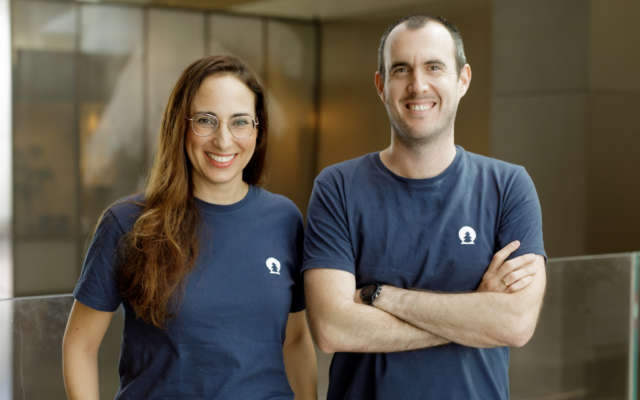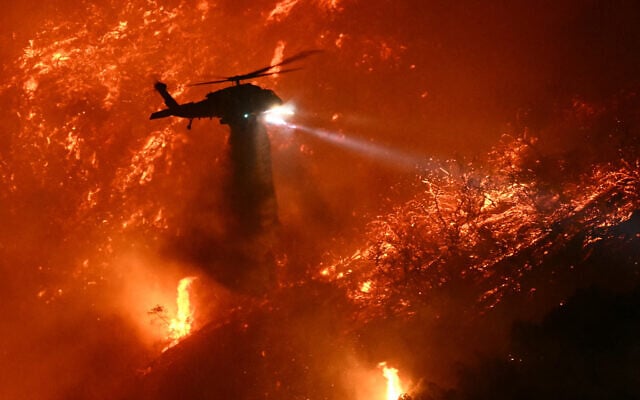- Joined
- Mar 11, 2013
- Messages
- 15,772
- Points
- 113
System shoots capsules of eco-friendly fire retardant to create barrier; detects and extinguishes blazes; set for testing in Israel in May, and the US in 2026
In the midst of war, as sirens were blaring almost every day to signal barrages of incoming rockets, Israel’s Iron Dome air defense system tracked and intercepted missiles to help protect and save lives. For Gadi Benjamini, the Iron Dome in January last year inspired the idea behind the development of a system to fight wildfires and prevent them from spreading.
“Similar to a war to fight wildfires, there are the firefighters, which are the infantry. There are airplanes, but darkness makes it harder to fly during the night and also during strong winds, and what we develop is a kind of artillery support,” FireDome co-founder and CEO Gadi Benjamini told The Times of Israel. “The biggest challenge in the climate tech area are wildfires, and more specifically, the reaction to wildfires, because many companies focus on detection.”
“What we develop is a system to enhance firefighters’ abilities and capabilities to address more fires simultaneously, like spot fires and embers and to reach places where sometimes they can’t, due to different logistics constraints that they have,” he added.
ounded in 2024 by CEO Benjamini and Dr. Adi Naor Pomerantz, FireDome is developing a wildfire defense system, modeled after the Iron Dome, that pairs defense tactics and AI technology. Designed to detect and suppress fires, the autonomous patent-pending system is geared to provide two layers of protection.
In response to an alert by the fire department that a wildfire is approaching an area, first, a mechanical stationary launcher releases capsules similar to projectiles that open before impact to disperse eco-friendly fire-retardant to create a protective barrier and block the path of encroaching wildfires. Second, an AI-powered system leveraging computer vision and sensor technology detects and extinguishes spot fires caused by airborne embers that bypass the primary barrier.
“The smart capsules contain sensors that allow us to program the specific location in which they open up, disperse the material in the air above the ground, and create a kind of dome protection around the property or asset, so if a fire approaches, it will block it and we have the second layer to identify and react to spot fires that are ignited by drifting embers,” said Benjamini. “Eventually, the property remains intact and without any damage, similar to how the Iron Dome protects a city or neighborhoods by intercepting missiles before they arrive.”

FireDome co-founders Gadi Benjamini (right) and Dr. Adi Naor Pomerantz. (Omer Hacohen)
Benjamini, a 14-year Israeli military veteran said that the first version of the system is being developed to protect around 100 acres of land from wildfires and is tailored for small neighborhoods, vineyards, and hotels or resorts in places prone to wildfires. The startup aspires to eventually protect an area of up to a mile.
FireDome plans to have the first system ready for testing in Israel around May, in areas, such as Jerusalem or the Carmel forest in the North, that are prone to wildfires. In 2026, the Tel Aviv-based startup aims to start pilot sites of the system in the US, targeting the Los Angeles and San Francisco areas.

A fire fighting helicopter drops water as the Palisades fire grows near the Mandeville Canyon neighborhood and Encino, California, on January 11, 2025. (Patrick T. Fallon / AFP)
Commenting on the deadly wildfires that erupted last week across Los Angeles County, Benjamini said it was too early to draw any conclusions or lessons because not all the data is available.
“We can handle strong winds and we can handle spot fires, which are the main advantages of our solution,” he remarked. “Putting out a fire at the interface between the wild land where the fire started and the neighborhood could have made a major difference, because we could have created barriers to protect these neighborhoods and we could have fought the spot fires that started there.”
“But we have to do more research and study what happened and then we will also publish main insights and conclusions that we can take to our solution to better design the product to be able to help with these types of wildfires,” he added.
As fires continue to rage across Southern California, a preliminary estimate by AccuWeather put the damage and economic losses between $135 billion and $150 billion. Wildfires cost the US anywhere from about $400 billion to about $900 billion annually.
FireDome emerged from stealth in December with $3 million in seed funding, led by climate-tech investors including US-based Third Sphere and Israel’s Gravity. Other investors backing the startup are Germany’s Caesar Fund, along with Atooro Fund and Vertex Ventures. It also secured a $1.5 million grant from the Israeli Innovation Authority to help bolster R&D operations. The startup is advised by Pinchas (Pini) Yungman, one of the founding fathers of the Iron Dome and David’s Sling defense systems.
